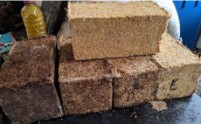A team of researchers at the Kwame Nkrumah University of Science and Technology (KNUST), Kumasi has tested new building materials made from coconut husk and corn husk fibers that can keep indoor spaces cooler and reduce the need for air conditioning.
The study published in International Journal of Building Pathology and Adaptation assessed how these locally fabricated bio-based composite bricks perform in controlling heat transfer through building walls.
Using advanced equipment and simulations, the researchers from the Mechanical Engineering Department measured the materials’ ability to regulate indoor temperatures over a 24-hour period.
The results showed that the bricks were effective in slowing down heat transfer and keeping indoor temperatures steady between 25.4°C and 27.4°C, even when outdoor temperatures varied.
The materials also provided up to eight hours of stable indoor comfort before any noticeable rise in heat. This means occupants could rely less on fans and air conditioners, saving energy and reducing electricity costs.
According to the study, potential energy savings could reach as high as 529 kWh per year for buildings using these eco-friendly bricks.
| Story: Emmanuel Kwasi Debrah (URO) |
The research offers practical benefits for builders and engineers by encouraging the use of local, affordable, and environmentally friendly materials.
This approach not only promotes green building adaptation but also reduces construction costs and creates jobs.
















